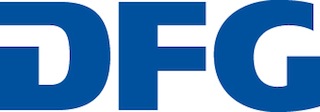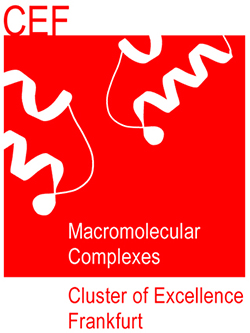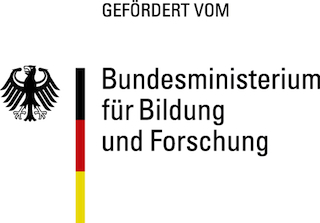Welcome to the Buchmann Institute for Molecular Life Sciences
The Institute was founded in 2009 as part of the Cluster of Excellence Frankfurt Macromolecular Complexes (CEF). We aim at understanding macromolecular complexes, in particular the molecular mechanisms underlying cellular functions. The Institute is composed of fifteen scientific groups from various disciplines including biology, physics, chemistry, and medicine. We are dedicated to perform basic research with biomedical relevance, to train young scientists, and to develop cutting-edge technologies in the life sciences.
News
21 May 2024
Derivatives of the thalidomide compound drive resistant cancer cells to their deaths

A new study points to the possibility that thalidomide derivatives are potentially suitable for treating cancer. Thalidomide was marketed in the 1950s as a sleeping pill. It later gained sad notoriety for causing severe fetal abnormalities in the early stages of pregnancy. It is now known that the molecule marks proteins in the cell for degradation. For the current study, the researchers produced thalidomide derivatives. They were able to show that these influence the degradation of proteins responsible for the survival of cancer cells.
6 February 2024
SCALE cluster proposal successful in first competition phase of the Excellence Strategy
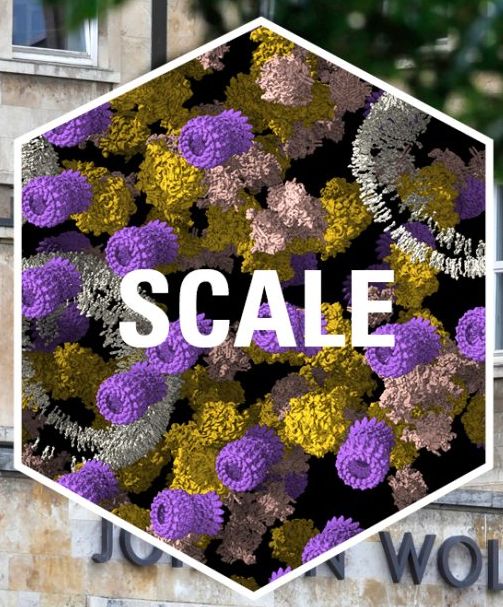
The SCALE cluster initiative has been invited to submit a full proposal for the Excellence competition.
6 September 2023
An escape signal for the nematode: Artificial intelligence helps elucidate the structure of a novel light sensor
A team of scientists from Goethe University Frankfurt, the Max Planck Institute of Biophysics, and the Simons Foundation's Flatiron Institute in New York has now elucidated the structure of LITE-1 – a completely new type of light-controlled ion channel. Instead of biochemical experiments, the researchers used artificial intelligence to elucidate the structure, and verified their structural model using biological experiments.
7 June 2023
When the cell digests itself: How inherited neurodegenerative diseases develop
Our cells are crisscrossed by a system of membrane tubes and pockets called the endoplasmic reticulum (ER). It is crucial for the production of biomolecules and is continuously built up and degraded. Degradation, known as ER-phagy, is promoted by the protein ubiquitin, which controls many processes in the cell. If the proteins involved in ER-phagy are defective, neurodegenerative diseases result. This has been discovered by an international research team led by Goethe University Frankfurt (as part of the EMTHERA research cluster) and Jena University Hospital and published in two papers in the renowned journal Nature.
30 May 2023
All-optical closed-loop voltage clamp for precise control of muscles and neurons in live animals
Identifying connections between distinct neurons and their contribution to driving behaviour is a central issue in neuroscience. To explore such relations, methods to record and concurrently regulate neural activity are needed. Excitable cells can be stimulated or inhibited by optogenetics. Since optogenetic actuation regimes are often static, neurons and circuits can quickly adapt, allowing perturbation, but not true control. A team of scientists now managed to develop an optogenetic voltage-clamp (OVC).
26 May 2023
Puzzle around a protein - Researchers from Frankfurt and Ulm provide important insights into the rare PURA Syndrome

Computational biologist Kathi Zarnack investigates what happens in the cells of patients with PURA Syndrome, a genetically determined neurodevelopmental disorder. In a study conducted jointly with Dierk Niessing at the University of Ulm, she has now come a significant step closer to solving the mystery. The study showed that the regulation and quality control of messenger RNAs in the cells were affected. Their findings about molecular and cellular networks could provide approaches to future therapy studies for the hitherto incurable disease.
03 February 2023
Ivan Ðikic receives Swiss Louis-Jentet Prize for Medicine
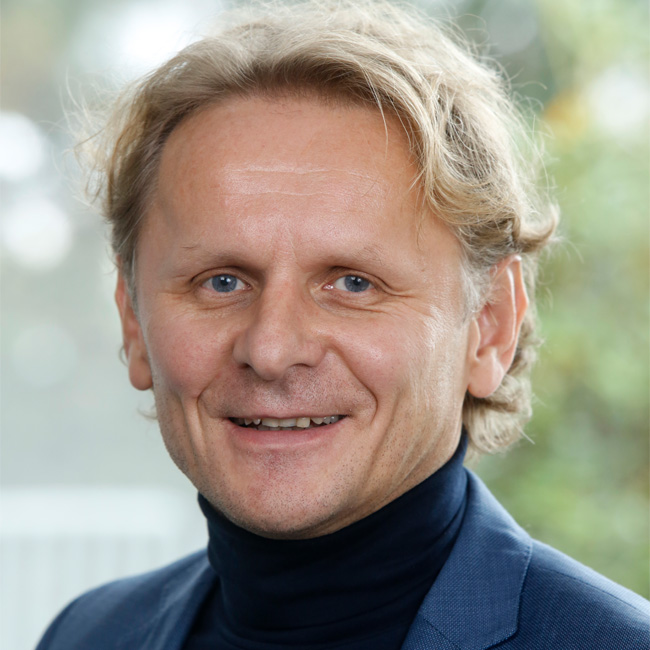
Congratulations to Ivan Đikić for receiving the Louis-Jeantet Prize for Medicine for his contributions to research into the ubiquitin system, one of the cell’s central regulatory systems. The award will be bestowed on Đikić and his cooperation partner Brenda Schulman from the Max Planck Institute of Biochemistry in Martinsried, near Munich. The Louis-Jeantet Prize for Medicine is one of the most prestigious awards for biomedical research and is endowed with 500,000 Swiss Francs (about 500,000 Euros).
- (photo by Uwe Dettmar)
30 September 2022
Unibator innovation award for Marcel Walther and Felix Rohde
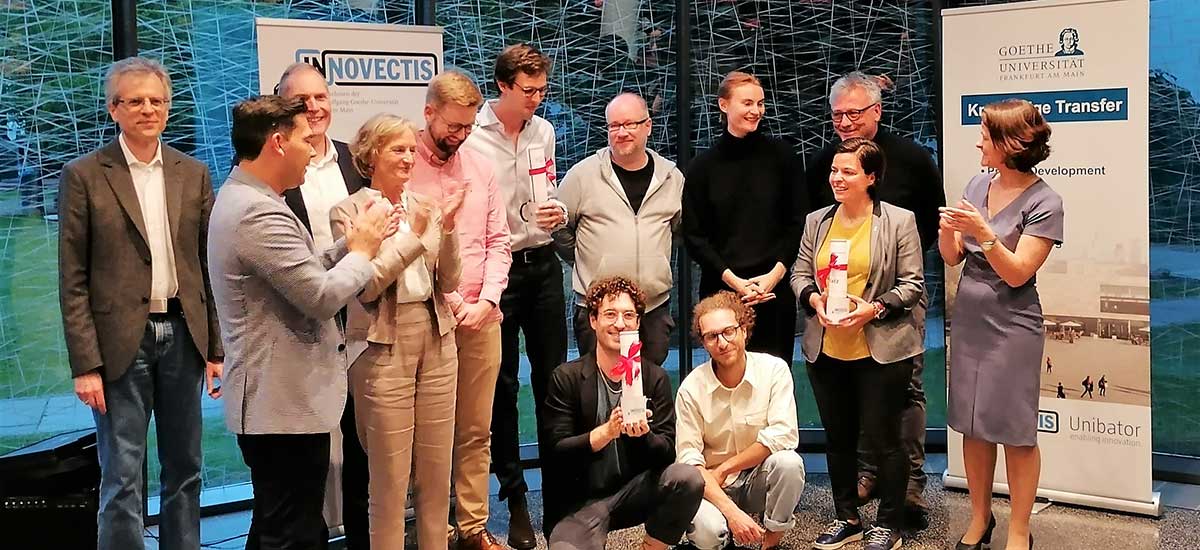
Congratulations to Marcel Walther and Felix Rohde from the Windbergs group for winning the first price of the Unibator Innovation Award. This award honours scientific projects with start-up potential.
28 September 2022
Sino-German MegaSyn Symposium 2022
“Metabolic and megaenzyme engineering for the biosynthesis of lipids and natural compounds"(October 10th to 12th in Frankfurt am Main, Germany)
A major aim of the Symposium is to highlight the latest, cutting-edge discoveries in the fields of metabolic and multienzyme engineering, protein analysis and natural compound discovery. The Symposium takes place at the Riedberg Campus of the University (Biocenter, lecture hall B2).
Participation in the conference is free of charge (no conference fees). The Symposium is designed as hybrid conference - zoom links are available upon request.
08 August 2022
Novel strategy to introduce fluorine into complex polyketides during biosynthesis
Over 90 percent of pharmaceutical drugs on the market today are small organic molecules and among those, natural products are highly represented. Fluorination has been widely used in medicinal chemistry for lead structure optimization. About a quarter of all small molecule drugs contain at least one fluorine atom, including the antidepressant Prozac, the cholesterol-lowering drug Lipitor and the quinolone antibiotic Ciprobay. Applications of organofluorine chemistry towards natural product biosynthesis are rare due to the paucity of enzymes that catalyse the addition of F atoms in secondary metabolism. Thus, new methods that enable fluorine derivatization are urgently needed to bridge the gap between the inherent bioactivity of a natural compound and its development as a therapeutic agent.
11 April 2022
LOEWE-Exploration funding for BMLS researchers: Nanobodies as a new approach for biological control of mosquitoes, bark beetles and other pests
 For their unconventional approach for a biological control of insect pests, Frederic Strobl and Ernst H.K. Stelzer received a 277.000 Euro grant as part of the HMWK’s LOEWE-Exploration funding line. The "Barquito" project aims to lay the methodological foundation for the usage of nanobodies, i.e. small antibodies that derive from alpacas, to reduce the fertility of specific insect pests.
For their unconventional approach for a biological control of insect pests, Frederic Strobl and Ernst H.K. Stelzer received a 277.000 Euro grant as part of the HMWK’s LOEWE-Exploration funding line. The "Barquito" project aims to lay the methodological foundation for the usage of nanobodies, i.e. small antibodies that derive from alpacas, to reduce the fertility of specific insect pests.
4 February 2022
Carcinogenesis: important findings on intracellular signal transmission
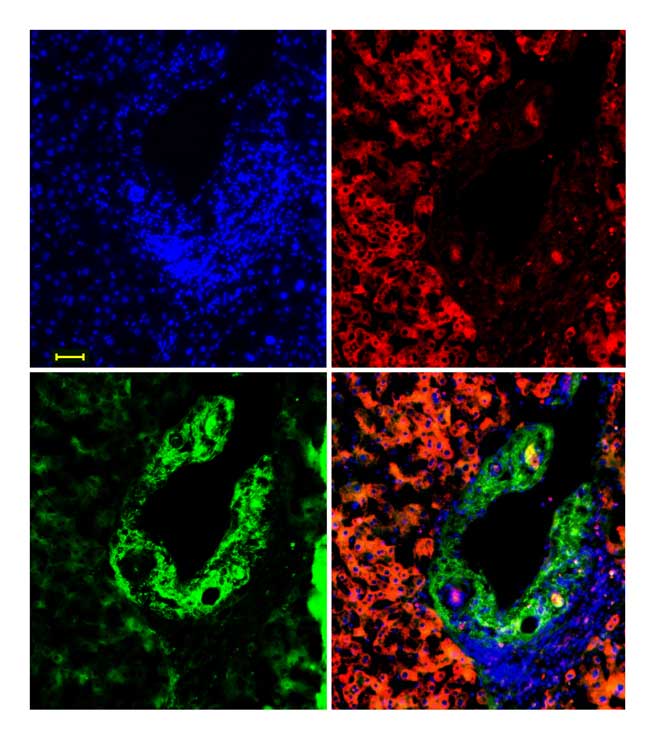 Transforming Growth Factor beta (TGF-β) is a signalling protein whose dysregulation can cause developmental disorders and cancer. Dr Xinlai Cheng and his colleagues at the Goethe University Frankfurt have discovered how a tumour suppressor known as pVHL influences signal transmission involving TGF-β. Their findings suggest possible starting points for developing new drugs.
Transforming Growth Factor beta (TGF-β) is a signalling protein whose dysregulation can cause developmental disorders and cancer. Dr Xinlai Cheng and his colleagues at the Goethe University Frankfurt have discovered how a tumour suppressor known as pVHL influences signal transmission involving TGF-β. Their findings suggest possible starting points for developing new drugs.
12 January 2022
Harald Schwalbe appointed as new instruct-ERIC director
 Instruct-ERIC has appointed Harald Schwalbe as its new Director, succeeding Sir David Stuart in the role.
Integrated structural biology has demonstrated its innovative power in a breath-taking manner in recent years, notably with impressive technological advances. As a European distributed research infrastructure, Instruct-ERIC has been at the forefront of this technological innovation, with centres across the continent providing access to advanced structural biology equipment and techniques.
Instruct-ERIC has appointed Harald Schwalbe as its new Director, succeeding Sir David Stuart in the role.
Integrated structural biology has demonstrated its innovative power in a breath-taking manner in recent years, notably with impressive technological advances. As a European distributed research infrastructure, Instruct-ERIC has been at the forefront of this technological innovation, with centres across the continent providing access to advanced structural biology equipment and techniques.
12 November 2021
A comprehensive review on light sheet fluorescence microscopy
 Light sheet microscopes reduce phototoxicity to such an extent that completely new experiments become possible. This technology is one of the cornerstones of the BMLS-hosted Frankfurt Centre for Advanced Light Microscopy. In their recent Nature Reviews Methods Primer, which is directed at newcomers and experts alike, Ernst Stelzer and Frederic Strobl discuss the history, technical background, applications and future trends of this technology together with international colleagues.
Light sheet microscopes reduce phototoxicity to such an extent that completely new experiments become possible. This technology is one of the cornerstones of the BMLS-hosted Frankfurt Centre for Advanced Light Microscopy. In their recent Nature Reviews Methods Primer, which is directed at newcomers and experts alike, Ernst Stelzer and Frederic Strobl discuss the history, technical background, applications and future trends of this technology together with international colleagues.
8 July 2021
Volkswagen Foundation funds two new SARS-CoV-2 research projects
The Target-RNA-antiV project will investigate how the gene regulation of the virus can be specifically disrupted (in collaboration with TU Darmstadt). The CoVmacro project will investigate how the viral protein nsP3 can be blocked (together with RWTH Aachen, LMU Munich and Forschungszentrum Jülich). The projects will be supported for 36 months each.
5 July 2021
EMBO postdoctoral fellowship for Santosh Kumar Kuncha
Santosh Kumar Kuncha was awarded with one of the prestigious Research Fellowships from the European Molecular Biology Organization (EMBO), which enable doctoral researchers from abroad to pursue their postdoctoral research in Europe and around the world. The proposed project focuses on understanding the molecular consequences of a unique Legionella-specific post-translational modification, called phosphoribosyl-ubiquitination (PR-Ub), of the human host proteome.
28 May 2021
Applications of heterobifunctional chemicals in cell biology
 New finding by the Cheng group and collaborators demonstrate that SF3B1 is PROTACable by utilizing noninhibitory chemicals. They further report that a proteome-wide analysis of PROTAC-FCPF-mediated Cas9FCPF protein degradation suggested a wide range of applications of perfluoroaromatics-induced proximity in the regulation of stability, activity, and functionality of any FCPF-tagging protein.
New finding by the Cheng group and collaborators demonstrate that SF3B1 is PROTACable by utilizing noninhibitory chemicals. They further report that a proteome-wide analysis of PROTAC-FCPF-mediated Cas9FCPF protein degradation suggested a wide range of applications of perfluoroaromatics-induced proximity in the regulation of stability, activity, and functionality of any FCPF-tagging protein.
6 May 2021
A look behind the scenes of the physical biology lab at BMLS
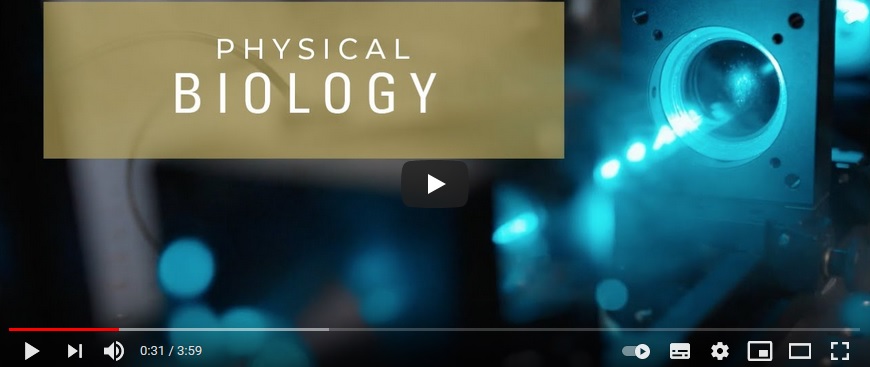 In a second beautiful new video describing the work of research groups in the Buchmann Institut this year, the Stelzer group provides an introduction to their work. The video was produced by the Frankfurt Institute for Advanced Studies in the context of the Giersch - Summerschool & International Conference 2021.
In a second beautiful new video describing the work of research groups in the Buchmann Institut this year, the Stelzer group provides an introduction to their work. The video was produced by the Frankfurt Institute for Advanced Studies in the context of the Giersch - Summerschool & International Conference 2021.
30 March 2021
Molecular basis for recovery after neuronal lesion
 The ability of the brain to adapt to its environment (its “plasticity”) is absolutely essential for its proper development and function. It is therefore essential to understand how the brain can adapt - and why it sometimes fails to do so. Scientists at Goethe University Frankfurt have now uncovered a molecular interaction that supports plasticity after a neuronal lesion. This interaction can promote neuronal recovery when stimulated - a discovery that opens up new therapeutic perspectives.
The ability of the brain to adapt to its environment (its “plasticity”) is absolutely essential for its proper development and function. It is therefore essential to understand how the brain can adapt - and why it sometimes fails to do so. Scientists at Goethe University Frankfurt have now uncovered a molecular interaction that supports plasticity after a neuronal lesion. This interaction can promote neuronal recovery when stimulated - a discovery that opens up new therapeutic perspectives.
30 March 2021
Interview with Ernst Stelzer available online
 In a podcast, Ernst Stelzer talks with The Microscopists about why scientists need to be able to take risks in their research, how he also worries about pursuing the right research, and how problems should be seen as opportunities.
In a podcast, Ernst Stelzer talks with The Microscopists about why scientists need to be able to take risks in their research, how he also worries about pursuing the right research, and how problems should be seen as opportunities.
16 March 2021
SR proteins as regulators of alternative transcript ends
 Scientists from Frankfurt identify the SR proteins SRSF3 and SRSF7 as important drivers of alternative polyadenylation in pluripotent mouse cells.
Scientists from Frankfurt identify the SR proteins SRSF3 and SRSF7 as important drivers of alternative polyadenylation in pluripotent mouse cells.
5 March 2021
A look behind the scenes of the electron microscopy lab at BMLS
 In a beautiful new video, PhD students of the Frangakis group provide an introduction to their work. The video was produced by the Frankfurt Institute for Advanced Studies in the context of the Giersch - Summerschool & International Conference 2021.
In a beautiful new video, PhD students of the Frangakis group provide an introduction to their work. The video was produced by the Frankfurt Institute for Advanced Studies in the context of the Giersch - Summerschool & International Conference 2021.
8 February 2021
PROXIDRUGS successful in Clusters4Future competition
The PROXIDRUGS consortium has been selected for funding within the Clusters4Future initiative of the Federal Ministry of Education and Research (BMBF), which aims at promoting regional innovation networks for the benefit of economy and society. PROXIDRUGS will be funded with up to 15 M € for the next three years, as only one of 7 clusters selected for funding from a total of 137 applications. The consortium concentrates on developing new treatments for diseases with high unmet medical need by utilizing the new concept of proximity induction in drug design.
8 February 2021
The State of Hesse funds research network on inflammation and infection
Frankfurt scientists were successful in securing funding for the ENABLE cluster project which aims at identifying disease-relevant key targets and enabling innovative therapeutic strategies. For the next four years, the project will be supported with 8 M€ by the State of Hesse as part of the cluster initiative to prepare for the next round of the federal Excellence Strategy. The ENABLE research program is centered around inflammation, infection and cellular homeostasis, which are all impacting on a broad range of diseases, many of them with high unmet medical need.
3 December 2020
DFG extends Collaborative Research Centre “Molecular and Cellular Mechanisms in Neural Homeostasis”
The Collaborative Research Centre 1080 was successful in the German Research Foundation’s current round of approvals and will start its third funding period in 2021. The DFG is providing € 2 million per year for four years of research. In the CRC 1080, scientists from different disciplines investigate how the brain and nervous system maintain stability as a complex system while also remaining accessible and flexible.
23 November 2020
Ivan Dikic honoured as Highly Cited Researcher 2020
For the third year in a row, Ivan Dikic is recognized as one of the pioneers in his field on Clarivate’s Highly Cited Researchers list. His research publications rank in the top 1% by citations in the field of “Molecular Biology and Genetics”.
23 October 2020
Development of novel vaccines: Goethe University founding team receives federal funding
Two young chemists at Goethe University want to develop highly effective vaccines using the carrier protein dodecine. To develop their idea into a product, the young scientists receive funding from the GO-Bio initial programme of the Federal Ministry of Education and Research.
15 October 2020
BMLS partner in US$ 7.2 million research project on Parkinson’s disease - Scientists investigate how mutations in the LRRK2 gene trigger Parkinson’s disease and what possible targets there are for drugs
About ten percent of Parkinson’s cases can be ascribed to mutations in the LRRK2 gene. Five research teams from the University of California in San Diego, Goethe University Frankfurt and the University of Konstanz want to explain in the next few years how mutations in the LRRK2 gene trigger Parkinson’s disease and what possible targets there are for drugs. The US-American initiative “Aligning Science Across Parkinson’s” has made the funding available for this project.
30 September2020
Substance with new mode of action against cancer: PROTAC-mediated degradation reveals a non-catalytic function of AURORA-A kinase
Researchers at Goethe University Frankfurt and the University of Würzburg have developed a new compound for treating cancer. It destroys a protein that triggers its development. The results of their work have now been published in the latest issue of Nature Chemical Biology.
5 August 2020
Double-hit therapeutic strategy against COVID-19 - Molecular differences between SARS and SARS-CoV-2
 When the SARS-CoV-2 virus penetrates human cells, it lets the human host cell produce proteins for it. One of these viral proteins, called PLpro, is essential for the replication and rapid spread of the virus. An international team of researchers led by Goethe University and University Hospital Frankfurt has now discovered that the pharmacological inhibition of this viral enzyme not only blocks virus replication but also strengthens the anti-viral immune response at the same time (Nature, DOI 10.1038/s41586-020-2601-5).
When the SARS-CoV-2 virus penetrates human cells, it lets the human host cell produce proteins for it. One of these viral proteins, called PLpro, is essential for the replication and rapid spread of the virus. An international team of researchers led by Goethe University and University Hospital Frankfurt has now discovered that the pharmacological inhibition of this viral enzyme not only blocks virus replication but also strengthens the anti-viral immune response at the same time (Nature, DOI 10.1038/s41586-020-2601-5).
9 July 2020
Awards for best BMLS theses 2019 go to Maja Klaus from the Grininger group and Dennis Vettkötter from the Gottschalk group
 Maja Klaus won the Josef Buchmann Doctoral Excellence Award for her PhD thesis on “Engineering of modular polyketide synthases” and Dennis Vettkötter won the Josef Buchmann Master Excellence Award for his master thesis “Development of optogenetic tools for clustering of synaptic vesicles”.
Maja Klaus won the Josef Buchmann Doctoral Excellence Award for her PhD thesis on “Engineering of modular polyketide synthases” and Dennis Vettkötter won the Josef Buchmann Master Excellence Award for his master thesis “Development of optogenetic tools for clustering of synaptic vesicles”.
9 July 2020
Congratulations to Enrico Schleiff on his election as President of Goethe University Frankfurt
 Enrico Schleiff was elected President of Goethe University Frankfurt by the extended Senate on Wednesday 8 July. The term of office is six years and will begin on 1 January 2021.
Enrico Schleiff was elected President of Goethe University Frankfurt by the extended Senate on Wednesday 8 July. The term of office is six years and will begin on 1 January 2021.
8 July 2020
DFG approves new research training group for image analysis in the life sciences
Modern microscopy techniques provide fascinating insights into tissues, cells and even large molecules. However, the data sets are now so large that advanced knowledge in image analysis is needed to interpret them. This will now be provided by an interdisciplinary research training group at Goethe University, located at the interface of life sciences and computer science. The project will be funded by the German Research Foundation (DFG) for the next 4.5 years.
7 July 2020
X-ray structure analysis gives detailed insights into molecular factory - How do bacteria build up natural products?
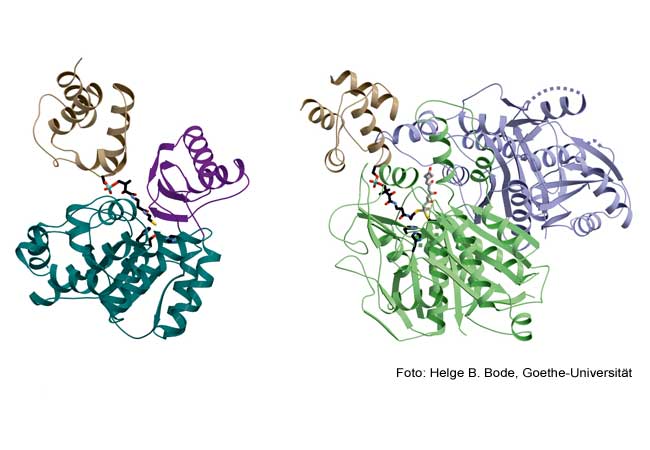 The active agents of many drugs are natural products, so called because often only microorganisms are able to produce the complex structures. Similar to the production line in a factory, large enzyme complexes put these active agent molecules together. A team of scientists from Goethe University Frankfurt and Technical University of Munich has now succeeded in investigating the basic mechanisms of one of these molecular factories.
The active agents of many drugs are natural products, so called because often only microorganisms are able to produce the complex structures. Similar to the production line in a factory, large enzyme complexes put these active agent molecules together. A team of scientists from Goethe University Frankfurt and Technical University of Munich has now succeeded in investigating the basic mechanisms of one of these molecular factories.
19 June 2020
Structure and mechanism of the adhesion complex from the human pathogen Mycoplasma genitalium
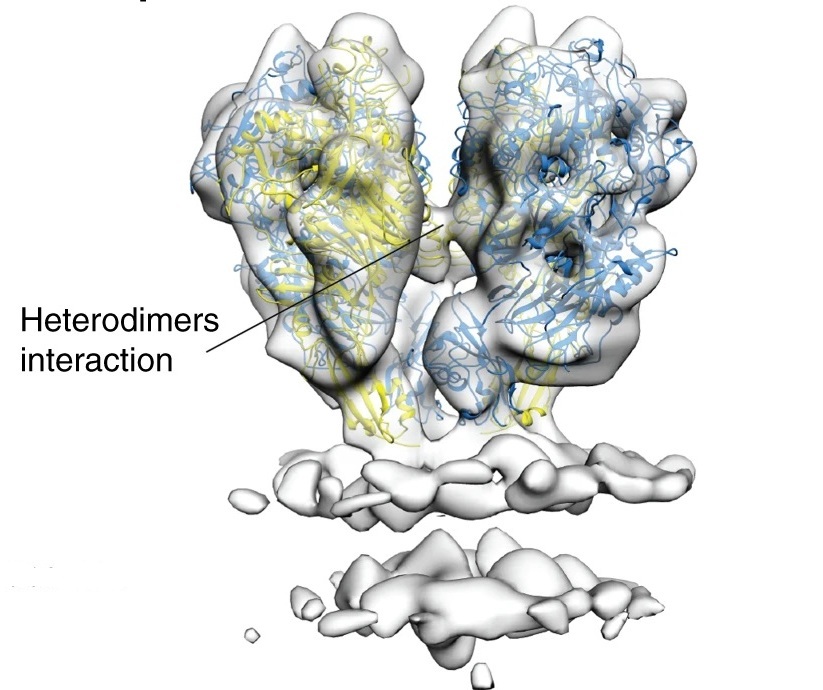 Mycoplasma genitalium is a human pathogen adhering to host target epithelial cells and causing urethritis, cervicitis and pelvic inflammatory disease. Essential for infectivity is its transmembrane adhesion complex called Nap. Together with colleagues in Barcelona, BMLS scientists investigated the structure and mechanism of the Nap adhesion complex and revealed an intricate interplay between its components.
Mycoplasma genitalium is a human pathogen adhering to host target epithelial cells and causing urethritis, cervicitis and pelvic inflammatory disease. Essential for infectivity is its transmembrane adhesion complex called Nap. Together with colleagues in Barcelona, BMLS scientists investigated the structure and mechanism of the Nap adhesion complex and revealed an intricate interplay between its components.


